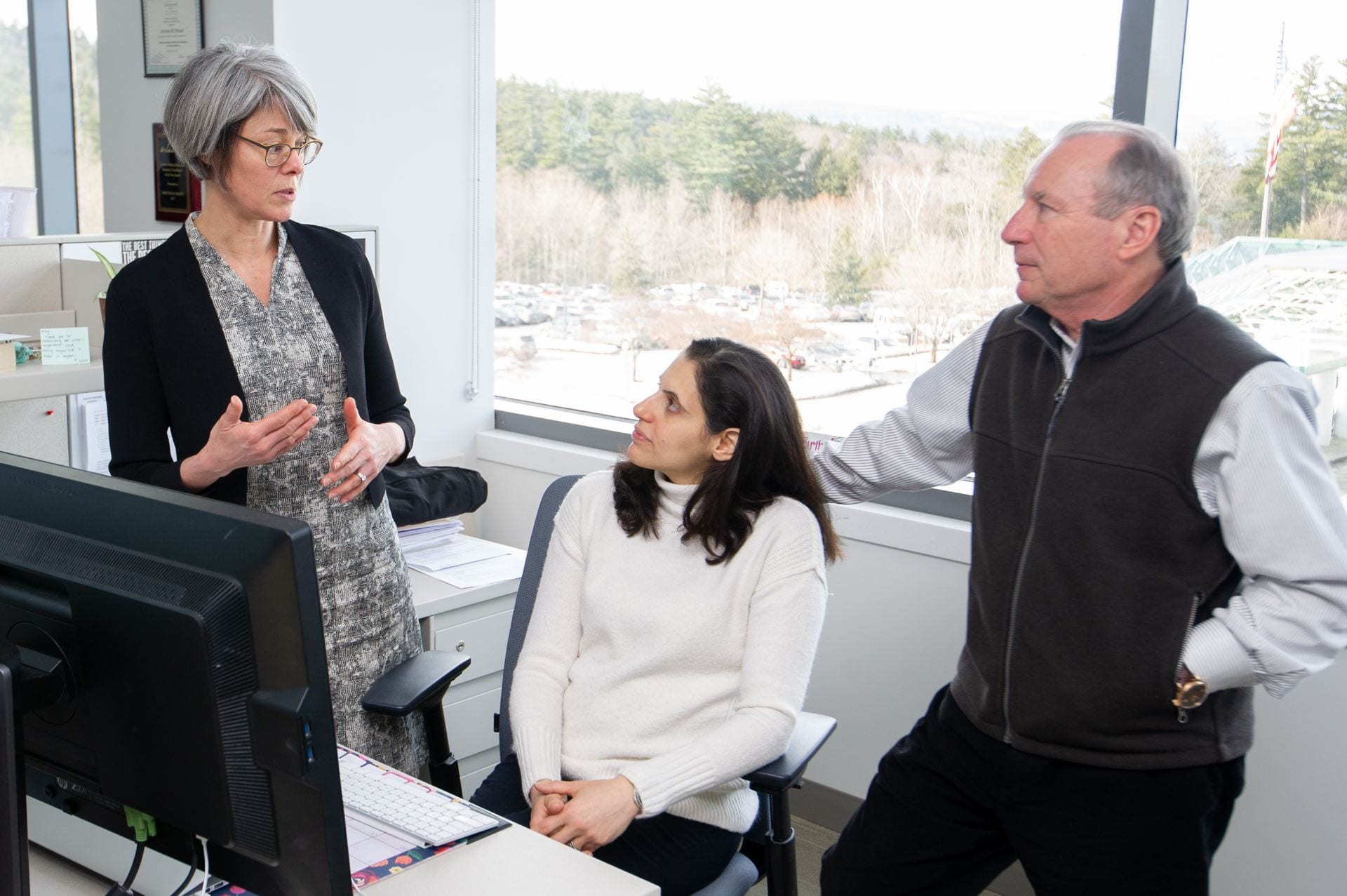Our Programs
COMMUNITIES OF PRACTICE

Coproduction Commons
In partnership with the International Society for Quality (ISQua), The Dartmouth Institute and the International Coproduction of Health Network (ICoHN) are developing and leading international learning tracks for further study of the coproduction of healthcare service. One track provides an “Interactive Discovery-based” series and another provides an open “Presentation-focused” education series. These education sessions are available to international health professionals.
Project Leaders: Tina Foster, Aricca Van Citters, Gene Nelson, Julie Johnson, Paul Batalden
Partner: International Society for Quality in Health Care
Project Dates: 2020-Present
Contacts: Joy McAvoy and Rachel Forcino

ESTABLISHING AND SUPPORTING LEARNING HEALTH SYSTEMS

Next Generation Learning Health System for Multiple Sclerosis (Next-Gen MS)
The Next-Gen MS study is a three-year cluster randomized prospective study comparing usual care to feed-forward patient-reported outcomes data enabled (coproduced) care in eight MS centers in North America. The Next Gen study will assess differences in quality of life and clinical disability outcomes in centers using the experimental intervention versus usual care controls. The study is connected to the national MS LINK population health registry study and features direct capture electronic health record and patient-reported outcomes data capability facilitated by the OM1 data analytics group enabling a full learning health system collaborative model.
Principal Investigator: Brant Oliver
Partner: EMD Serono
Project Dates: 2021 – 2024
Contact: Fal Mehta

Evaluation of the Cystic Fibrosis Care Center Model Response to COVID-19 and the Cystic Fibrosis Learning Network
This evaluation will explore the perceptions of people living with cystic fibrosis (CF) (including adults with CF and parents/guardians of children with CF), and care teams regarding uptake, experiences, advantages, and disadvantages of telehealth to support delivery of high-quality clinical care. It will also evaluate the perceptions of the Cystic Fibrosis Learning Network, its strengths, and opportunities for improvement.
Team Members: Aricca Van Citters, Joel King, Madge Buus-Frank, Peter Scalia, Eugene Nelson (PI)
Partner: Cystic Fibrosis Foundation
Project Dates: 2020 – Present
Contact: Aricca Van Citters

IBD Qorus Treat-to-Target (TTT) Initiative
As part of the larger Qorus initiative to improve the quality of care for people with inflammatory bowel disease, the TTT initiative will begin with an 18-month IHI breakthrough series collaborative to assess the feasibility of implementing a TTT program in over 30 IBD care centers across the United States and then will proceed to prototype care pathways and implementation studies of TTT intervention on IBD population health outcomes. This project will provide improvement advisor and methodologist support to Qorus leadership for the TTT initiative, development of a comprehensive QI data analytics and visualization program to assess the value of IBD care and empower and facilitate improvement and strategic planning for Qorus, and related research and dissemination efforts during a three year project period.
Team Members: Alice Kennedy, Brant Oliver (PI), Madge Buus-Frank (PI)
Partner: Crohn’s & Colitis Foundation
Project Dates: 2021 – 2023
Contact: Alice Kennedy

Promise Partnership Learning Health System in Oncology
The Promise Partnership Learning Health System in Oncology brings together the knowledge, skills, and experience of health leaders, clinicians, and researchers from Dartmouth-Hitchcock Health (D-HH), The Dartmouth Institute for Health Policy and Clinical Practice, and the Norris Cotton Cancer Center together with patients and families in support of D-HH’s strategic initiative “The Promise”—which seeks to provide the best care possible for the patients, people, and the communities it serves.
The Partnership is focused on implementing a learning health system across the Cancer Center’s 14 clinical oncology groups, with the goal of demonstrating improvement in key measures of health outcomes and service, including patient and family experience; team well-being/joy in work; clinical, and functional health outcomes; diversity, equity, inclusion, and belonging; cost, resource utilization, and financial indicators; research and teaching engagement and productivity; and creating a learning culture and community of practice.
Team Members: Gene Nelson, Kathy Kirkland, Anna Tosteson, Madge Buus-Frank, Megan Holthoff, Beth O’Donnell, Joel King, and Aricca Van Citters
Partner: Gordon and Betty Moore Foundation
Project Dates: 2020 – Present
Contact: Megan Holthoff

Dissemination of Learning Health Systems for Coproducing Effective Action
The goal of this project is to build the capacity of healthcare stakeholders to design, develop, implement, and scale Learning Health Systems for Coproducing Effective Action. This project will create the infrastructure and resources to support a learning infrastructure, technical support, and evaluation model. It will also build stakeholder capacity to extend the approach to vulnerable populations.
Team Members: Gene Nelson (PI), Aricca Van Citters, Joel King
Partner: Robert Wood Johnson Foundation
Project Dates: 2018-2021
Contact: Aricca Van Citters

Creation of a Palliative Care Learning Health System Incubator
The goal of this project is to measurably improve the quality of life for people with serious illness by engaging in the rapid co-design and development of a dashboard and support network to coproduce better care experiences, higher health care value, and more knowledge on the science of palliative health care delivery.
Principal Investigators: Gene Nelson & Amber Barnato
Partner: Gordon and Betty Moore Foundation
Project Dates: 2018-Present
Contact: Megan Holthoff
Read more here: https://tdi.dartmouth.edu/news-events/theres-strength-numbers-people-facing-serious-illness

Multiple Sclerosis Continuous Quality Improvement (MS-CQI) Collaborative
The Multiple Sclerosis Continuous Quality Improvement (MS-CQI) Collaborative is the first national multi-center quality improvement research collaborative for multiple sclerosis (MS) in the United States. The goal of MSCQI is to use patient reported and clinical information from 4 participating MS centers to study and improve outcomes and experience of care for people with MS. MSCQI features an online platform which can be used by patients and clinicians to inform and coproduce care, population level feedback reporting to MS centers to inform improvement, and a step-wedge randomized research design to study the effect of QI interventions on outcomes over 3 years.
Principal Investigator: Brant Oliver
Partner: Biogen
Project Dates: 2018-Present
Contact: Fal Mehta



Enabling Uptake of a Registry-Supported Care and Learning System in the U.S. & Ongoing Development of a National Program of Quality Improvement in CF Care
Principal Investigator: Gene Nelson
Partner: Cystic Fibrosis Foundation; Robert Wood Johnson Foundation
Project Dates: 2014-2018
Contact: Aricca Van Citters
Read more here: https://www.cff.org/Care/Clinician-Resources/Network-News/March-2018/CF-Health-Check-Building-Partnerships-Through-Shared-Information/
DATA & MEASUREMENT


Measuring Coproduction Using coopeRATE: A Validation Study
The goal of this study is to establish new methods for measuring and improving collaborative goal setting between patients and their care providers in cystic fibrosis (CF) care.
Principal Investigator: Glyn Elwyn
Partner: Cystic Fibrosis Foundation
Project Dates: 2018-Present
Contact: Gabrielle Stevens
A “COVID Compass” for Navigating COVID-19 Pandemic
The COVID Compass is designed as a central framework for navigating the pandemic. It could help decision-makers to effectively monitor and mitigate harms caused by COVID-19 and could be adapted for future pandemics. The Compass will track COVID mortality rates and excess deaths alongside key trends in other important areas such as economic vitality and social hardship. This is designed to help guide policies, actions, and behaviors that together influence lives lost and livelihoods damaged.
Project Investigator: Eugene Nelson
Co-Investigator: Brant Oliver
Team Members: Falguni Mehta, Jabeen Ahmad, Evans Amoah, Sukdith Punjasthitkul, Joel King
Project Dates: June 2020 – December 2021
Contacts: Gene Nelson
Learn more about this work: COVID Compass
SHARED DECISION MAKING

Cost talk: A randomized stepped wedge trial of interventions helping patients and clinicians discuss cancer care costs during shared decision making.
This study evaluates the impact of a shared-decison-making conversation aid that includes cost information about localized prostate cancer treatment options on urologist-patient cost conversations and decision-making processes.
Project Leaders: Mary Politi and Glyn Elwyn
Partner: Robert Wood Johnson Foundation
Project Dates: 2020-Present
Contacts: Rachel Forcino

Comparing Telehealth Preferences Among Patients and Clinicians
The project goal is to compare attitudes, preferences, and current access to telehealth options between clinicians and the populations they serve in both rural and urban contexts.
Project Investigator: Glyn Elwyn
Partner: Abridge
Project Dates: 2020-Present
Contacts: Rachel Forcino


Multi-Component Implementation of Shared Decision Making for Uterine Fibroids Across Socioeconomic Strata
Principal Investigators: Glyn Elwyn
Partner: Patient-Center Outcomes Research Institute
Project Dates: 2018-Present
Contact: Rachel Forcino

